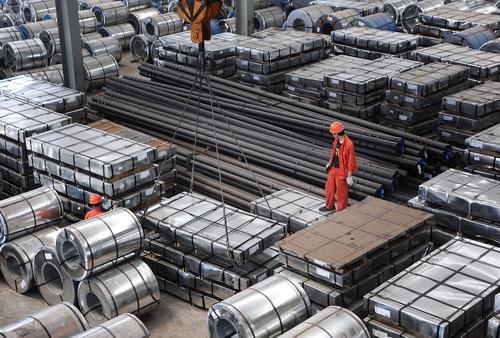Rising raw material costs, iron ore shortage seen as contributory factors
BEIJING: Steel prices will continue to remain at high levels this year, with mild fluctuations, on the back of rising raw material costs and a shortage of iron ore, a top industry association official said on Wednesday.
The big three global miners, BHP Billiton, Rio Tinto and Vale, are taking advantage of the global scenario of supplies falling short of demand to push for higher iron ore prices, said Luo Bingsheng, vice-chairman of the China Iron and Steel Association (CISA).

A worker stands on top of stacks of steel products at a Shanghai Yirong Trading Co Ltd warehouse in Shanghai. Steel inventories in 20 major Chinese cities declined 9 percent to 9.77 million tons last week. [Agencies]
China's first quarter crude steel output rose 24.5 percent from a year earlier, while production in the rest of the world grew 33 percent during the same period.
Crude steel output from countries with large iron ore imports like Japan and some European countries rose 50.7 percent and 37 percent respectively, he said.
Steel prices will fluctuate on the higher side, despite the recent decline, he said.
Prices of construction steel products dropped by 20 yuan ($2.93) to 40 yuan per ton on Wednesday in Shanghai, on smooth market trading volume, according to Mysteel.com.
The agency's composite steel price index, a major gauge of domestic steel prices, dropped 169 points on April 23, down 0.6 percent from the previous week after the government released macro economic policies to rein in property prices.
Steel inventories in 20 major cities declined 9 percent to 9.77 million tons by last week, while steel inventories rose 34 percent to 10.74 million tons by the end of March, he said.
Luo said the three big miners are obsessed with the idea of maximizing profits in the short term.
"They ignore the long-term benefits and abandon the principles of a win-win situation for suppliers and buyers," he said, adding that surging iron ore costs have squeezed Chinese steelmakers' profits.
Seventy-seven major large-and medium-sized steel mills reported a profit of 21.7 billion yuan in the first quarter, down 14.3 percent compared to the last quarter, he said.
The average profit ratio of steel industry only reached 3.25 percent, still lower than the country's average industry profit ratio.
Luo said China should encourage domestic iron ore miners to expand production to reduce dependence on global miners.
During the first quarter, domestic iron ore output rose to 204 million tons, up 21 percent from a year ago, he said.
Iron ore imports accounted for 62.3 percent of total consumption, with China controlling just 9 percent of the imported resources.
China should take a lesson from developed countries, who control nearly 50 percent of iron ore imports. It should also emulate big steel mills like ArcelorMittal which are increasing investments in overseas mining resources, he said.





